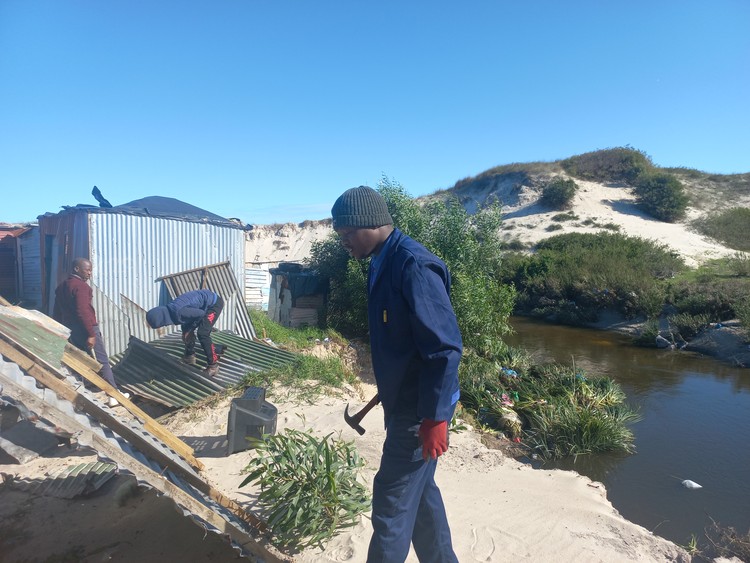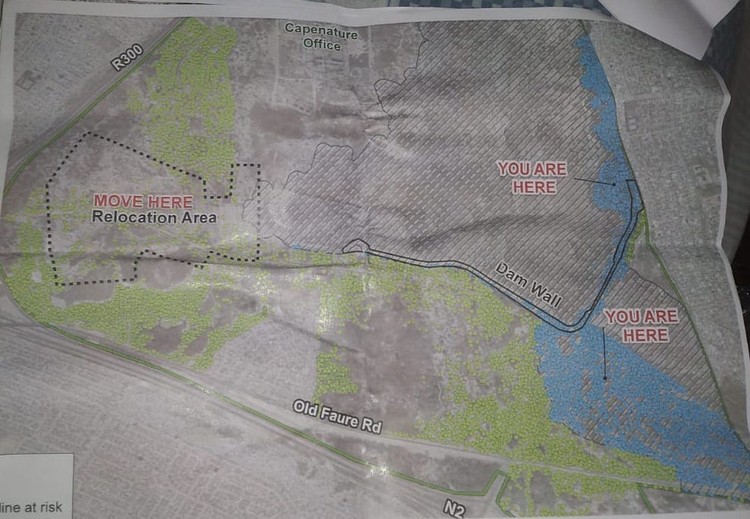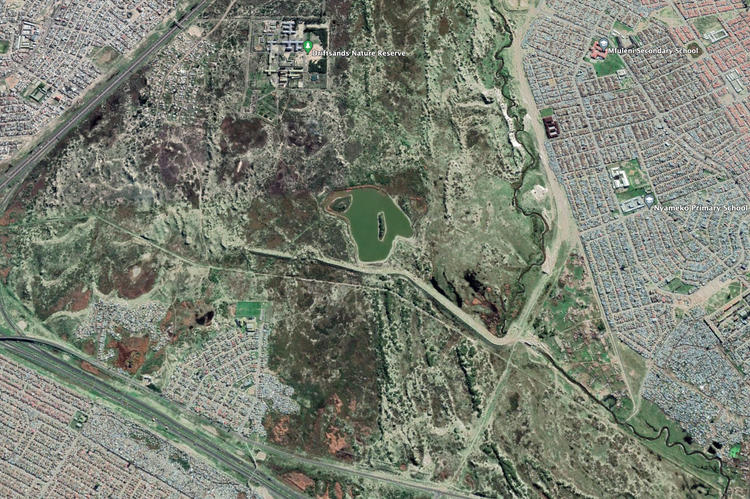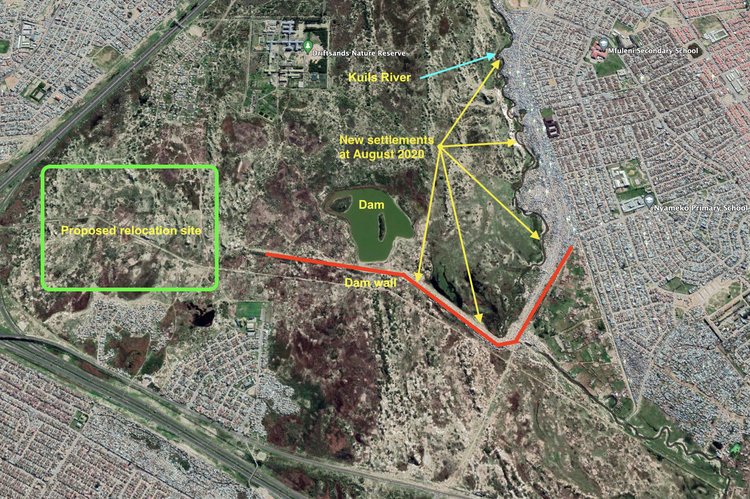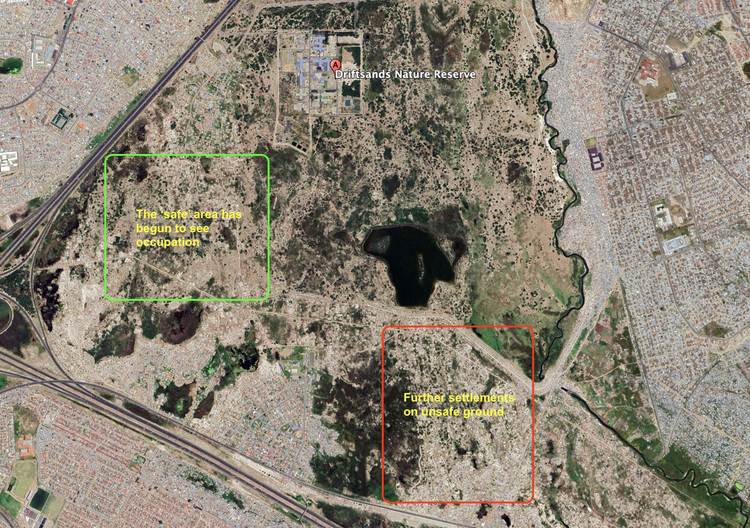We won’t move, say Driftsands families living on floodplain
About 50 shacks have been moved to a safer site
Ndumiso Hedeni, a resident of Covid informal settlement, dismantles his shack in Driftsands Nature Reserve to relocate to safer ground on 25 June. Photo: Siphokazi Mnyobe
- Only about 50 out of thousands of shacks in Driftsands Nature Reserve have moved to safer ground since last month’s floods.
- Cape Nature and the Western Cape Human Settlements Department asked people living on land at risk of flooding to relocate to a safer area in the nature reserve.
- Many residents are resisting the move saying they want to remain close to schools; others want the City of Cape Town to provide them with serviced plots.
The relocation of shacks erected on unsafe ground in Driftsands Nature Reserve is proceeding slowly. Only 50 out of about 7,000 shacks alongside the Kuils River and the Driftsands dam retaining wall have been moved since floods inundated the settlement and swept away some shacks during heavy rains last month.
GroundUp reported that CapeNature and the Western Cape Department of Human Settlements had asked people to relocate to the western parts of the nature reserve which is less exposed to flooding.
Later in June, we also reported that heavy rains had swept away 45 shacks and affected 400 other shacks in what is known as Covid informal settlement, according to community leader Luthando Mcuntula.
Phumlani Mangaliso, another community leader, said about 50 shacks have relocated from the dam wall to the safer site identified by government officials in the lower side of Driftsands Nature Reserve, and some others have shifted to another unapproved spot within the same area.
Nathan Adriaanse, spokesperson at the Western Cape Department of Human Settlements, said relocation from these areas is crucial, as people living there are at risk whenever there is a significant amount of rainfall over a sustained period of time.
Photo of a map indicating safe and unsafe grounds in Driftsands Nature Reserve provided to occupiers by the Western Cape Provincial Department of Human Settlements. Source: Provided
When Sinoxolo Mafuya’s shack flooded, she decided it was best for her to do as CapeNature and Human Settlements had advised.
“After the floods, sand coming from the river was splashing on top of my shack and it was starting to bend … I was scared that when the heavy rains come my shack might not survive again,” said Mafuya.
Mafuya says she paid about R750 to move and reinstall her shack. She is unemployed and her friends helped her with the cost of moving.
Resident Aphiwe Mini, whose shack was flooded last month, said he is not prepared to move further away from his children’s school.
“I work as a petrol attendant. I support my family in the Eastern Cape and the people I stay with here. I will not have money for transportation for them. My kids are not used to walking far to school,” said Mini.
Mini stays on the banks of the Kuils River, and his children attend nearby Nyameko Primary School. By GroundUp’s calculations, the proposed relocation site would require his children to walk about 2.5km to school by road instead of just 100 metres from where they currently live.
Another resident, Siyabonga Konana, also said he will not move. He said that the relocation site will not be serviced by the City, as it is a wetland. He wants the City to provide him with a relocation site that will be serviced.
“We are living like animals here, there’s no dignity in how we live. People here go to the toilet behind their shacks and people can even see you. I will move to where I know I won’t live like this,” said Konana.
Driftsands Nature Reserve in July 2020. Source: Google Earth
Driftsands Nature Reserve in August 2020. In the space of a month, thousands of shacks were erected along the river bank, and along the dam wall. Source: Google Earth
Driftsands Nature Reserve, July 2022. Source: Google Earth
The informal settlement in the Driftsands Nature Reserve was established in the second half of 2020. Adriaanse told GroundUp that his department estimated that 11,000 new structures were erected in the nature reserve between April to September 2020.
Satellite imagery of Driftsands Nature Reserve from Google Earth shows a stark contrast between July and August 2020. Within the space of a month, the entire east bank of the Kuils River was occupied by shacks, and many structures were also erected along the retaining wall of the nature reserve’s dam.
Malusi Booi, mayoral committee member for human settlements, told GroundUp that the City cannot assist unlawful occupiers who settle in areas which are not conducive for human habitation. In areas like Driftsands, environmental impact regulations also apply.
Booi said alternative accommodation is currently a challenge as many land parcels which could have been considered for alternative accommodation purposes were occupied during the Covid pandemic.
Support independent journalism
Donate using Payfast

Next: Climate justice coalition marches to Ramaphosa’s office
Previous: Police commissioner and MEC witness mob justice assault in Khayelitsha
© 2022 GroundUp. This article is licensed under a Creative Commons Attribution-NoDerivatives 4.0 International License.
You may republish this article, so long as you credit the authors and GroundUp, and do not change the text. Please include a link back to the original article.
We put an invisible pixel in the article so that we can count traffic to republishers. All analytics tools are solely on our servers. We do not give our logs to any third party. Logs are deleted after two weeks. We do not use any IP address identifying information except to count regional traffic. We are solely interested in counting hits, not tracking users. If you republish, please do not delete the invisible pixel.

